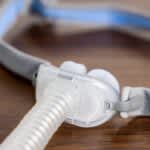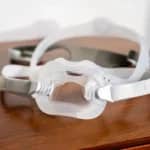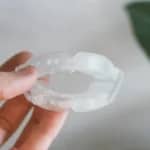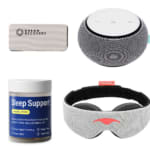Medical Disclaimer: The following content should not be used as medical advice or as a recommendation for any specific supplement or medication. It is important to consult your health care provider prior to starting a new medication or altering your current dosage.
GABA is one of the supplements I get asked a lot by patients, often with looks of confusion on their faces. I think the confusion comes from the fact that GABA is both a chemical produced within body AND a supplement that’s made for ingestion. Unlike melatonin, which is also produced within the body and as a supplement, GABA isn’t nearly as well known—nor has it received nearly the amount of scientific attention as melatonin supplement. Given the interest and popularity of GABA—and the importance of the body’s own GABA to sleep, mood, and health—it’s definitely worth spending some time talking about.
Key Takeaways
- GABA is an amino acid that helps regulate brain activity and promotes relaxation.
- GABA plays a crucial role in preparing the body for sleep by reducing excitability.
- GABA supplements are available, but their effectiveness as sleep aids still requires research.
What Is GABA?
GABA, or Gamma-Aminobutyric acid, is an amino acid produced naturally in the brain. GABA functions as a neurotransmitter, facilitating communication among brain cells. GABA’s big role in the body is to reduce the activity of neurons in the brain and central nervous system, which in turn has a broad range of effects on the body and mind, including increased relaxation, reduced stress, a more calm, balanced mood, alleviation of pain, and a boost to sleep.
Many medications interact with GABA and GABA receptors in the brain, altering their function to achieve certain effects, often relaxation, pain relief, stress and anxiety reduction, lowering blood pressure, and improving sleep. Barbiturates, anesthetics, benzodiazepines, anti-depressants and anti-seizure medications are some of the medications that target GABA.
In addition, a number of natural supplements affect GABA activity, to help relieve stress and anxiety, promote a balanced mood, and help with sleep. I’ve written about valerian and hops, magnesium, and L-theanine, all of which have an effect on the brain’s GABA activity. Other natural supplements that may affect the brain’s GABA activity include L-arginine, kava, passionflower, American ginseng and others.
GABA is found naturally in varieties of green, black, and oolong tea, as well as in fermented foods including kefir, yogurt and tempeh. Other foods contain GABA or may boost its production in the body, including whole grains, fava, soy, lentils and other beans, nuts, seafood, citrus, tomatoes, berries, spinach, broccoli, potatoes, and cocoa.
GABA is also available as a supplement. GABA supplements are often used to treat high blood pressure, stress and anxiety, and sleep, as well as to stimulate the body’s natural growth hormone, often by athletes.
Having Trouble Sleeping?
Sleep aids can help, but it’s important to address underlying issues like sleep apnea. Answer these questions to see if you’re at risk.
How Does GABA Work?
I call GABA the brakes of the brain. GABA is the body’s most important inhibitory neurotransmitter, which means it lowers the activity of neural cells in the brain and central nervous system, having the effect of moving the brain and the body into lower gear. By inhibiting neural activity, GABA facilitates sleep, reduces mental and physical stress, lowers anxiety, and creates a calmness of mood. GABA also plays an important role in regulating muscle tone. In combination with glutamate, the body’s most important excitatory neurotransmitter, GABA is an important contributor to the body’s overall mental and physical homeostasis, or balance.
GABA plays a role in the healthy functioning of the body’s immune and endocrine systems, as well as in the regulation of appetite and metabolism. There’s also interesting emerging research about GABA’s role in gut health and gastrointestinal function, where it may work to support motility, control inflammation and support immune system function, and help to regulate hormone activity.
Low GABA activity in the body can result in:
- Anxiety
- Chronic stress
- Depression
- Difficulty concentrating and memory problems
- Muscle pain and headaches
- Insomnia and other sleep problems
There is ongoing investigation and debate about how GABA supplements work in the body, and how their mechanisms of action may differ from the body’s own internally-produced GABA. Specifically, scientists have not reached consensus about whether, or how effectively, supplemental GABA crosses what’s known as the blood-brain barrier—meaning, how well it moves from the bloodstream directly into the brain. There remains real need for additional research into the effects of supplemental GABA, including how GABA may affect the nervous system via the gut.
Benefits of GABA
Below, I’ll talk about what science tells us today about the potential effectiveness of GABA supplements for sleep and other conditions.
For Sleep
The body’s own GABA activity is important for sleep. GABA enables the body and mind to relax and fall asleep, and sleep soundly throughout the night. Low GABA activity is linked to insomnia and disrupted sleep. In one study, GABA levels in people with insomnia were almost 30 percent lower than in people without the sleep disorder. And these low GABA levels also corresponded to more restless, wakeful sleep. Big-pharma sleep medications including those with zolpidem (Ambien and others) and eszopiclone (Lunesta and others) target the body’s GABA system to increase sedation and sleep. Research indicates that one negative side effect of these sleep medications—hallucinations—may result from their alterations to GABA activity.)
There’s relatively limited research that investigates the direct benefits of supplemental GABA for sleep. Some recent research suggests that GABA produced in fermented food may increase sleep time and decrease the time it takes to fall asleep. Another recent study showed a combination of GABA and 5-HTP may together improve sleep quality and increase sleep time. Given the importance of GABA to the body’s sleep patterns, more research into the effects of GABA supplements on sleep is sorely needed!
For Stress and Anxiety
As a natural chemical the body produces, GABA’s primary role is to diminish the activity of neurons in the brain and central nervous system, which puts the body in a greater state of relaxation, and alleviates stress and anxiety. Supplemental GABA may benefit sleep by aiding relaxation and providing relief from anxiety and stress. There remains debate among scientists about supplemental GABA’s effectiveness in reducing anxiety and stress, because of longstanding questions over supplemental GABA’s ability to enter the brain from the bloodstream.
While that scientific debate goes on, some studies have shown GABA to be effective in lowering anxiety and boosting relaxation. One small study of a group of 13 adults showed GABA effective as a relaxant and anxiety reliever, with slowed brain waves seen within an hour of taking the supplement. This study also found a boost to immune system also occurred with GABA, suggesting supplemental GABA may enhance immunity in people who are undergoing mental stress.
Another larger study investigated the effects of 100 milligrams of GABA among a group of people who’d recently undertaken a stressful mental task. Scientists measured a slowing down of brain waves in the people who’d taken GABA, pointing to an alleviation of mental stress. Another study tested the effects of GABA in people who were about to take a stressful math test. People who ate chocolate infused with GABA rebounded more quickly from the test-related stress, including stress-lowering changes to heart-rate variability.
For High Blood Pressure
GABA supplements are sometimes used by people as a natural way to lower blood pressure. There is scientific evidence indicating that GABA may work to reduce high blood pressure. In one study of people with borderline high blood pressure, 12 weeks of use of a type of algae that is rich in GABA, significantly lowered blood pressure. In addition to being important on its own, maintaining a healthy blood pressure can also help protect your sleep. A natural drop in blood pressure at night is one part of the body’s progression into sleep. High blood pressure can be a sign of hyper-arousal, a state of physical alertness and vigilance that can make it difficult to fall asleep and stay asleep. Poor sleep and sleep disorders, particularly sleep apnea, contribute to high blood pressure, and can lead to the kind of hypertension that is difficult to treat.
Our Top Pick for Melatonin Supplements

Sleep Is the Foundation Sleep Support Melatonin Capsules
Taking melatonin supplements can help you sleep better and longer — as long as your doctor approves. The Sleep Is the Foundation Sleep Support Melatonin Capsules are effective, vegan, gluten-free, and affordable.
GABA: What to Know
I’ve seen patients experience relief from anxiety, reduced stress, and improved sleep via the relaxing impact of supplemental GABA. I don’t think we’ve seen nearly enough research to have a sufficient understanding of how GABA supplements might affect stress, mood, and sleep, or other ways GABA as a supplement may benefit emotional, cognitive, and physical health.
GABA Dosing
In general, it is recommended that users begin with the lowest suggested dose, and gradually increase as needed. Based on amounts that have been investigated in scientific studies, 10-20 mg benefited high blood pressure, while higher doses of 100-200 mg benefited sleep, stress, and anxiety.
Possible Side Effects of GABA
GABA oral supplements are generally well tolerated by healthy adults. Some people may experience negative side effects, including:
- Gastric distress
- Nausea
- Diminished appetite
- Constipation
- Burning throat
- Drowsiness and fatigue
- Muscle weakness
- Shortness of breath, at very high doses
GABA Interactions
These are commonly used medications and supplements that have scientifically-identified interactions with GABA. People who take these or any other medications and supplements should consult with a physician before beginning to use GABA as a supplement.
- High blood pressure medications: GABA can lower blood pressure. If you take GABA in addition to taking blood pressure medication, your blood pressure may drop too low.
- Anti-depressant medications: People taking anti-depressant medications should consult with their physicians before taking GABA.
- Neurally-active medications: People taking medications that affect brain activity should consult their physicians before taking GABA.
- Herbs and supplements that may lower blood pressure: Because GABA may lower your blood pressure, if you take GABA along with other herbs or supplements that also may lower blood pressure, the combination may lead to your blood pressure dropping too low.
References
The Sleep Doctor Forum: Real Experiences, Real Connections
Continue the discussion on the Sleep Doctor Forum. Connect with experts and fellow forum members on CPAP, sleep apnea, and all things sleep. A priceless resource that’s free to join.

























